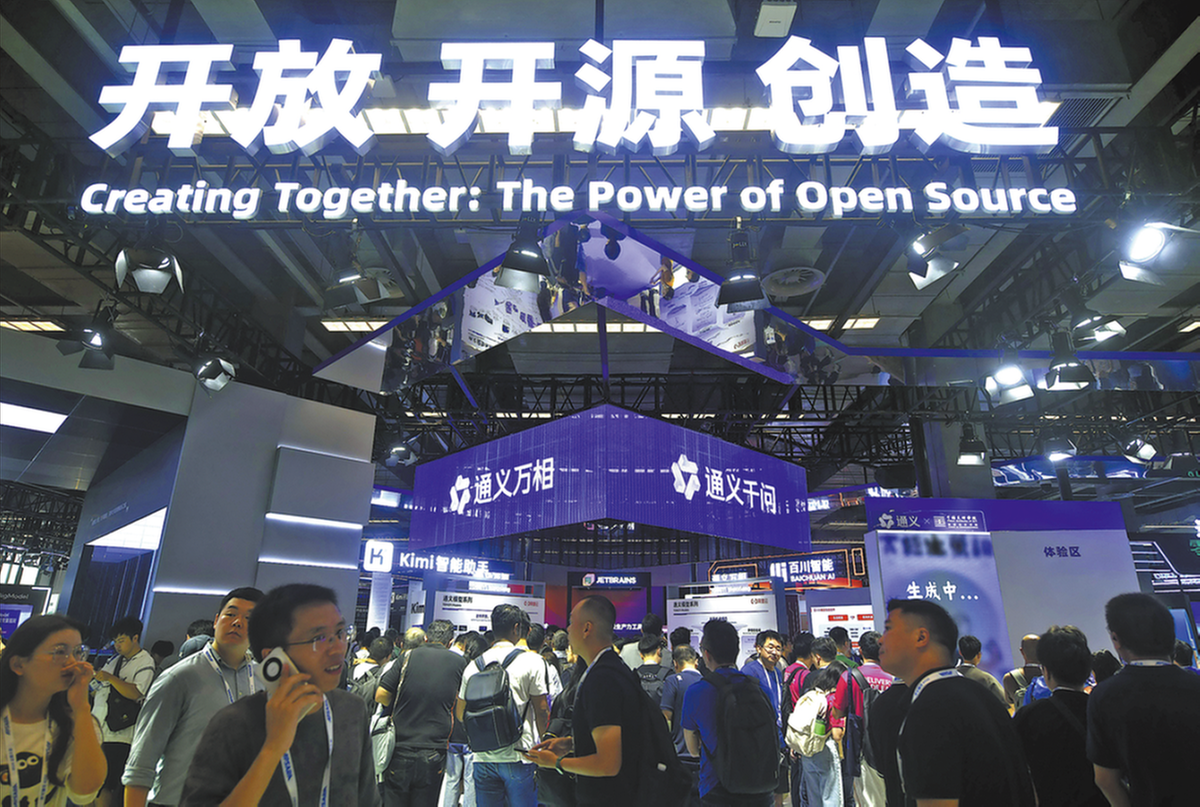Alibaba Cloud ramps up efforts in open-source AI
Company eyes more breakthroughs with wider application of Qwen LLMs


Alibaba Cloud, the cloud computing arm of Alibaba Group, is doubling down on open-source artificial intelligence models as the tech heavyweight aims to bolster the application of fast-evolving tech in a wider range of sectors, and make the technology more accessible and easier to use.
Ye Jieping, vice-president of Alibaba Cloud, said Alibaba's Qwen family of models has achieved full-scale and full-modality open-sourcing, effectively breaking down the long-standing technical barriers between open-source and closed-source AI models.
Ye said AI model technology is undergoing a historical transformation, shifting from "incremental innovation" to "exponential leapfrogging", adding that the large language models are currently seeing explosive growth and iterating each week.
Alibaba Cloud boasts China's largest AI open-source community platform, ModelScope. The platform, which was launched in November 2022, has gathered over 70,000 open-source models, and the user base has expanded from 1 million in April 2023 to 16 million as of June 30, serving 16 million developers across the globe.
"We remain committed to investing in advanced AI infrastructure to foster the widespread adoption of generative AI technologies across different industries," said Zhou Jingren, chief technology officer of Alibaba Cloud Intelligence.
Zhou said the company is ready to empower developers and corporations of all sizes, enhance their abilities to leverage AI technologies, and further stimulate the growth of the open-source community.
During the 2025 World Artificial Intelligence Conference in Shanghai, Alibaba showcased three new open-source large language models, each of which has claimed top positions globally in its respective category — foundational models, coding models and reasoning models.
For instance, Qwen3-Coder, its most advanced AI coding model, excels in AI coding tasks, from generating new code and managing complex coding workflows to debugging across entire code bases.
Additionally, Alibaba is open-sourcing Qwen Code, a powerful interface tool that enables developers to delegate engineering tasks to AI using natural language.
The company has said that it would invest more than 380 billion yuan ($52.95 billion) in building cloud and AI hardware infrastructure in the next three years. It will pour more resources into the research and development of AI applications and computing power, and deeply integrate AI across its businesses to capture new growth opportunities in the AI era.
Pan Helin, a member of the Expert Committee for Information and Communication Economy, which is part of the Ministry of Industry and Information Technology, said the open-source models will allow resource-constrained startups, small businesses and entrepreneurial developers to access cutting-edge AI tech and build their own models cost-effectively.
Pan said it will lower the threshold for the development and application of AI by enabling more global developers to create customized industry-specific models, and help foster the sharing of AI tech around the world.
He added that the open-source approach will also speed up the popularization of AI tech across various sectors, including automobiles, manufacturing and education, and allow more enterprises and developers to participate in AI R&D.
China has solidified its position as a global leader in AI innovation, and released 1,509 AI models to date, ranking first among the 3,755 models launched globally to date, according to the China Academy of Information and Communications Technology (CAICT).
The country's AI industry is expanding rapidly, fueled by a continuous stream of new technologies, applications and business models, and has become a key growth driver for high-quality economic and social development, said Yu Xiaohui, president of the CAICT.
Alibaba has also entered the AI wearable devices market with the debut of its Quark AI glasses during this year's WAIC, which is its first self-developed smart eyewear powered by the Qwen large language model and Quark's multimodal AI capabilities.
A key highlight is the deep integration with Alibaba's ecosystem.
Users can access navigation through the innovative display system of Amap, a navigation app developed by Alibaba, and use Alipay to watch and pay, compare prices on Taobao while shopping, and receive travel alerts from Fliggy — all through voice interactions.



































